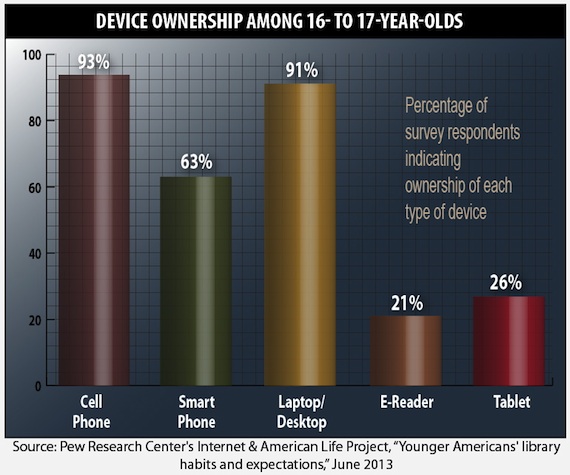American Teens Well Equipped with Technology
High schoolers aged 16 to 17 are among the most technologically well equipped of any age group in the United States, according to a report released Tuesday by the Pew Research Center's Internet & American Life Project.
According to the research, published in the study "Younger Americans' library habits and expectations," a full 91 percent of 16- to 17-year-olds own traditional desktop and laptop computers, beating out all other age groups. The next-highest group in the study was 30- to 49-year-olds, at 85 percent. Americans aged 18 to 24 and those aged 25 to 29 reported ownership levels of 82 percent. Among 50- to 64-year-olds, that figure was 75 percent. And ownership of computers in the 65-plus crowd was 57 percent.
The 16–17 group also had the highest Internet usage among all groups, at 100 percent of the study sample, and 94 percent reported having Internet access at home. The age groups between 18 and 49 all reported home internet access at 84 percent to 86 percent. For the 50–64 demographic, that figure dropped to 75 percent and fell to 65 percent in the 65-plus demographic.
Ninety-four percent of Americans aged 18 to 24 own a cell phone (either a smart phone or feature phone). That's slightly higher than high school-aged kids, 93 percent of whom own a mobile phone, and the next age group up (25–29), 91 percent of whom own a mobile phone.
Broken down, the 18–24 group tied for first place for smart phone ownership, at 65 percent, with Americans aged 25–29. A slightly lower percentage of kids aged 16–18 reported owning a smart phone — 63 percent. All other age groups came in at 60 percent or lower.

On the tablet front, high school-aged kids reported the second-highest device ownership at 26 percent, tied with the 25–29 crowd. They were beaten out by the 30–49 group, which reported ownership at 35 percent. Twenty-three percent of 18- to 24-eard-olds reported owning a tablet, 19 percent of the 50–64 group, and 15 percent of Americans aged 65 or older.
High school-aged teens ere also among the highest ranked in ownership of e-readers at 21 percent. The were beaten only by the 30–49 group at 26 percent. Only 14 percent of 18- to 24-year-olds reported owning an e-reader (tying with the 65-plus group), compared with 17 percent in the 25–29 group and 18 percent in the 50–64 demographic.
The latest Pew report was based on a survey of 2,252 Americans aged 16 and older. The research was underwritten by the Bill & Melinda Gates Foundation. Compete details are available in the Pew Internet library research portal at pewinternet.org.